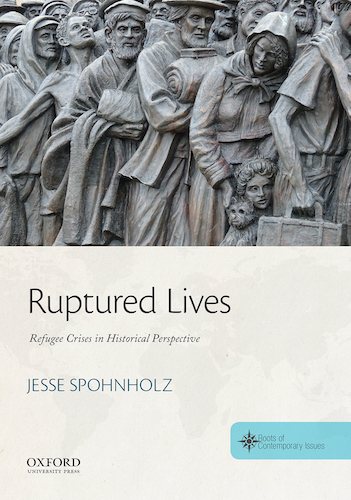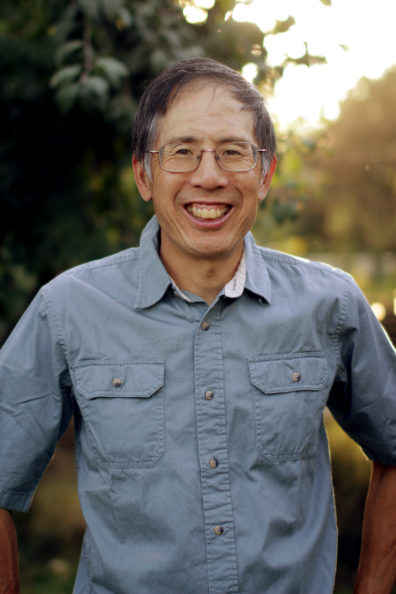Education
Ph.D., University of Iowa, 2004
M.Litt., Reformation Studies Institute, University of St. Andrews, 1999
B.A., Reed College, 1996
Research and Teaching Interests
Spohnholz’s research focuses on social practices of toleration in Reformation-era Germany and the Netherlands, experiences of religious refugees during Europe’s Age of Religious Wars, and historical memory of the Reformation. His first book, The Tactics of Toleration (2011), explores the daily tactics of peaceful coexistence along the Dutch/German border during Europe’s Age of Religious Wars. His second book, The Convent of Wesel: The Event that Never Was and the Invention of Tradition (2017), solves a 450-year-old mystery and examines historical memory of the Reformation in the Netherlands and northwest Germany from the sixteenth to the twentieth-first century. His third book, Ruptured Lives: Refugee Crises in Historical Perspective (2020), examines the causes and effects of refugee movements in world history. In 2021, he completed a seven-year project funded by the Dutch Research Council with Mirjam van Veen, at the Vrije Universiteit Amsterdam, that explores the experiences of sixteenth-century Dutch religious exiles living in the German-speaking lands. Their book that emerged from that project is Dutch Reformed Protestants in the Holy Roman Empire, c.1550–1620: A Reformation of Refugees (2024). He is also Director of the History for the 21st Century project of the World History Association that offers free, student-centered and inquiry-driven curricula to faculty and students.
Selected Honors & Awards
2024-26 National Endowment for the Humanities, Humanities Initiatives at Colleges and Universities Grant (with Brenna Miller as co-PI)
2024 Faculty Peer Mentoring Award. College of Arts and Sciences. Washington State University.
2022 Sahlin Faculty Excellence Award for Instruction, Washington State University
2018 Albert C. Outler Prize, awarded by the American Society of Church, for best ecumenical church history monograph, biography, critical edition or bibliography published in the two previous years
2018 DAAD/GSA Book Prize, awarded by the German Academic Exchange Service and the German Studies Association for the best book in German history published in the previous two years
2017 University Distinguished Teaching Fellowship. Washington State University
2017 William F. Mullen Memorial Teaching Award. College of Arts and Sciences. Washington State University
2014 Research Grant (Free Competition) from the Dutch Research Council (€750,000), with Mirjam van Veen (Vrije Universiteit Amsterdam)
2013–2014 Scholar in Residence, Vrije Universiteit Amsterdam
2012 Gerald Strauss Book Prize in Reformation History, awarded by the Sixteenth Century Society
2011 Thesis Advisor of the Year, Honors College, Washington State University
2011 Eric W. Bell Learning Communities Excellence in Teaching Award, University College, Washington State University
2009 Harold J. Grimm Prize for the best journal article in Reformation studies, awarded by the Sixteenth Century Society
2005 Fritz Stern Dissertation Prize, awarded by the German Historical Institute
Publications
Books
 |
Dutch Reformed Protestants in the Holy Roman Empire, c.1550–1620: A Reformation of Refugees (With Mirjam van Veen, Rochester, NY: University of Rochester Press, 2024). |
 |
Ruptured Lives: Refugee Crises in Historical Perspective (Oxford: Oxford University Press, 2020). |
 |
The Convent of Wesel: The Event That Never Was and the Invention of Tradition (Cambridge: Cambridge University Press, 2017). Listen to a podcast interview about this book here |
 |
With Carina Johnson, David M. Luebke, and Marjorie E. Plummer, Archeologies of Confession: Writing the German Reformation, 1517–2107 (New York: Berghahn Books, 2017). |
 |
The Tactics of Toleration: A Refugee Community in the Age of Religious Wars (Newark, DE: University of Delaware Press, 2011). |
 |
With Gary K. Waite, Exile and Religious Identity, 1500–1800 (London: Pickering and Chatto, 2014). |
Articles
“Constitutional Dynamism and Demographic Diversity in Early Modern Confessional Coexistence: Dutch Reformed Refugees in the Holy Roman Empire, 1554–1596.” In Early Modern Toleration: New Approaches, edited by Benjamin J. Kaplan and Jaap Geraerts, 133–52. London: Routledge, 2024.
With Brenna Miller, “Backward Design and Forward Thinking in the Introductory World History Course: Recentering World War I as an African and African Diasporic Experience.” World History Bulletin 89, no. 2 (2023): 27–34.
With Brenna Miller. “Collaboratively Reforming General Education History Education: A Roadmap for the 21st Century.” The Proceedings of the H-Net Teaching Conference, 1 (2023): 77–87.
“Refugees in the Early Modern Atlantic World.” Peer-reviewed teaching module for the History of the 21st Century project (www.history21.com), 2023.
“A Response to Philip Benedict’s ‘Of Church Orders and Postmodernism.’” As a part of a Discussiedossier dedicated to The Convent of Wesel: The Event that Never was and the Invention of Tradition. BMGN-The Low Countries History Yearbook 136, no. 1 (2021): 78–90.
“Reformed Exiles and the Calvinist International in Reformation-Era Europe: A Reappraisal.” Handbook of Calvin and Calvinism, edited by Bruce Gordon and Carl Trueman, 237–52. Oxford: Oxford University Press, 2021.
“The Polyphonies of Microhistories: Yair Mintzker and The Many Questions of Historical Perspective.” Central European History, 53, no. 1 (2020): 221–27.
“Refugees.” In John Calvin in Context, edited by R. Ward Holder, 143–51. Cambridge: Cambridge University Press, 2019.
“Exile Experiences and the Transformations of Religious Cultures in the Sixteenth Century: Kleve, England, East Friesland, and the Palatinate.” Journal of Early Modern Christianity, 6, no. 1 (2019): 43–67.
“Social Fiction and Diversity in Post-Reformation Germany.” Bulletin of the German Historical Institute 61 (Fall 2017): 1–17.
With Mirjam G. K. van Veen, “The Disputed Origins of Dutch Calvinism: Religious Refugees in the Historiography of the Dutch Reformation.” Church History 86, no. 2 (2017): 1–29.
“Invented Memories: The ‘Convent of Wesel’ and the Origins of German and Dutch Calvinism.” In Archeologies of Confession: Writing Histories of Religion in Germany, 1517–2017, edited by Carina Johnson, David M. Luebke, Marjorie E. Plummer, and Jesse Spohnholz, 284–303. New York: Berghahn, 2017.
“Archiving and Narration in Post-Reformation Germany and the Netherlands.” Past and Present 230, suppl. 11 (2016), 330–48.
With Mirjam G. K. van Veen. “Calvinists vs. Libertines: A New Look at Religious Exile and the Origins of ‘Dutch’ Tolerance.” In Calvinism and the Making of the European Mind, edited by Gijsbert van den Brink and Harro M. Höpfl (Leiden: Brill, 2014).
“Instability and Insecurity: Dutch Women Religious Refugees in Germany and England, 1550‒1600.” In Exile and Religious Identity, 1500‒1800, edited by Jesse Spohnholz and Gary Waite (London: Pickering and Chatto, 2014).
“Toleration.” In Oxford Bibliographies in Renaissance and Reformation, edited by Margaret King (New York: Oxford University Press, 2014).
“Calvinism and Religious Exile during the Revolt of the Netherlands (1568–1609).” Immigrants and Minorities (2013): 1‒27.
“Confessional Coexistence in the Early Modern Low Countries,” in A Companion to Multiconfessionalism in the Early Modern World, edited by Thomas Max Safley (Leiden: Brill Publishers, 2011).
“Turning Dutch? Conversion in Early Modern Wesel,” in Conversion and the Politics of Religion in Early Modern Germany, edited by David M. Luebke, Jared Poley, Daniel Ryan, and David Warren Sabean (Providence: Berghahn Books, 2011).
“Multiconfessional Celebration of the Eucharist in Sixteenth-Century Wesel,” Sixteenth Century Journal 39, no. 3 (2008).
“Olympias and Chrysostom: The Debate over Wesel’s Reformed Deaconesses, 1568–1609,” Archive for Reformation History/Archiv für Reformationsgeschichte 98 (2007).
“Strangers and Neighbors: The Tactics of Toleration in the Dutch Exile Community of Wesel, 1550–1590,” Bulletin of the German Historical Institute 38 (2006).
“Overlevend non-conformisme: Anabaptistische tradities en hun regulering in laat zestiende-eeuws Wezel.” Doopsgezinde Bijdragen 29 (2003).
























